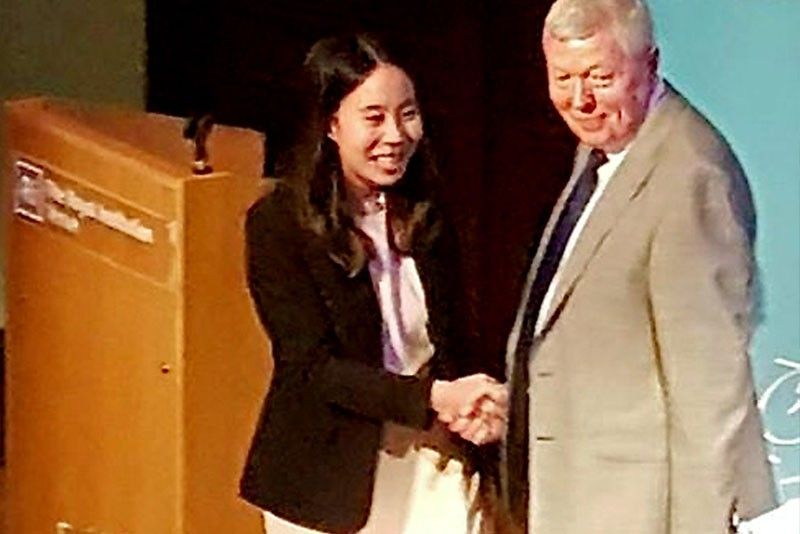A Filipina tops London speaking contest


Another young Filipina did our country proud on May 19 by besting 52 other student competitors in the annual English Speaking Union’s International Public Speaking Competition in London.
Twenty-year-old Jazmin Tan Jabines, a UP Diliman junior in business administration, thus became the third representative of the English Speaking Union Philippines chapter to win the global competition. Patricia Evangelista emerged as grand finals champion in 2004, while Gian Carlo Dapul did the same in 2008.
Having three champions in only 17 years since its inception in 2002 marks a distinguished record for ESUPhil, whose earliest supporters included then Philippine Ambassador Cesar Bautista, then consular media officer Ed Maranan, and Loline Reed of London, who personally hosted our delegates for over a decade. They must all be smiling proudly up there over their legacy.
Jazmin won the national finals conducted at FEU Makati last February, with ESU-Phil officers as the judges: chair Gigi Virata, Dr. Lourdes Montinola, Erlinda Panlilio, Butch Dalisay and this writer. Other ESU-Phil members include Ed Chua, Atty. Kat Legarda, Santi Dapul, Chito Sobrepeña, and the British Council’s Mike Cabigon.
Jazmin was welcomed at Heathrow by Gene Alcantara, who with his wife Carmela hosted her at their home before she joined the other delegates.
For the preliminary heats, Jazmin’s five-minute speech was “Great artists have no country” — dwelling on the EJKs and how these have inspired Filipino artists to express universal protest.
She made it to the Grand Finals with six others — from China, Hong Kong, South Korea, Lebanon, Estonia and the United States, with the American lady as the only other female finalist.
The judges’ panel was chaired by Alan Johnson, who had served as UK Home Secretary in 2009-2010. The other judges were Tommy Seagull and Amanda Moorghen.
The topic for the finals was “The best way to predict the future is to invent it.” Here’s Jazmin’s speech, titled “One Hour at a Time.”
I had just one hour. One hour was all I needed — to recreate my memories with a person that time and circumstance had yanked away from my life. I was waiting at the international airport in Manila, because after ten years, she was finally coming home. My aunt would be back in the Philippines for her layover! For ten years we had exchanged pictures and video calls, but I knew that these were nothing compared to an hour of meeting in the flesh.
The Filipino diaspora is often talked about in numbers — they are the 12 percent of our nation spread across the continents, the $US 2 billion in remittances they send home every month — but this neglects a larger part of the story — the daily sacrifices conducted in far-away countries. The stories of our Overseas Filipino Workers aren’t just stories of success. They are also stories of invention — of finding new ways to succeed where none exist.
Our clock started ticking when a voice announced the arrival of her flight. We had our faces pressed on the glass as we waited for the balikbayans or the returnees who had come home. As soon as I saw my aunt pass through the airport gates, I knew. I am lucky to have a family that can make the journey back.
Not every Filipino working abroad can make the journey back home. Many of us get left behind. Many remain as TNTs, literally “those who hide.” They live as undocumented immigrants, playing an endless game of hide-and-seek with the authorities. They invent new identities, facing the anxiety that comes with hiding, fearful of being deported back home. In the United Kingdom alone, there are an estimated 600,000 undocumented immigrants, who long for the lives they’ve left behind.
I have 30 minutes left with her. The sweeping vistas of the countryside we used to visit were now the gray horizon of concrete pavement as we saw airplanes fly in and out. She will leave soon, along with the rest, to a life where she is needed — indispensable yet invisible at the same time. After all, they are half a million seafarers of the world, travelling to places as far as Malta, Italy, and the Netherlands. They will nurse you back to health as they fill the 5,000 vacancies in this country’s health care system. And they will take care of your children when you are too busy with work, when all they wish for is to be back home with their own.
Because this isn’t just a story of those who leave. It’s also a story of those who get left behind. These are the spouses, the children, the nephews and nieces, who also need to invent their futures apart. In my case, I had to reinvent ours at the terminal, until our ticking clock’s time had finally run out. It is an ironic fact of a migrant’s life that to show someone you love them, you often have to leave.
But that doesn’t mean we can’t invent new ways to connect, to be as much a family as ever. Because we families do what we do best. We rebuild our lives across the oceans, reinvent our ties with those we love, one hour at a time — whether it’s the hours we spend on Skype calls, or the hours we spend with all our relatives back home for Christmas, or the hours we spend praying for those who are absent — every immigrant family invents their own unique way of spanning that distance and strengthening their love.
We can’t change circumstance, but we can predict the future of our families by inventing it. We pick up the pieces they’ve left behind, and invent a new kind of dream for ourselves and for them.
For the last time, I saw my aunt pass through the airport gates, but this time, without a heavy heart. After all, our futures can still be written — one hour at a time.



















